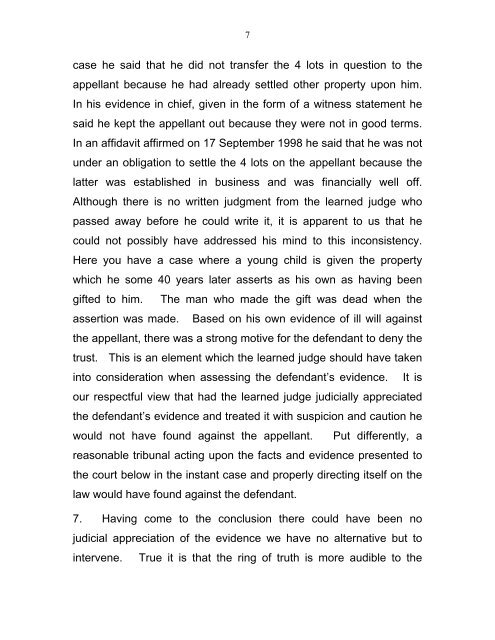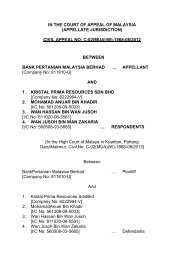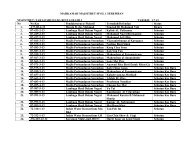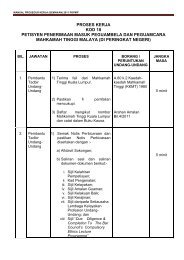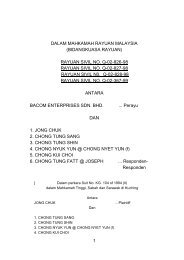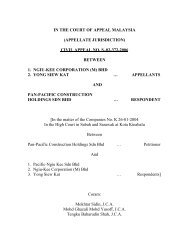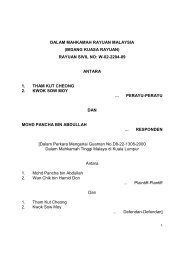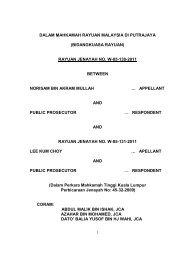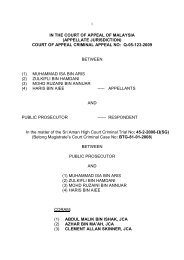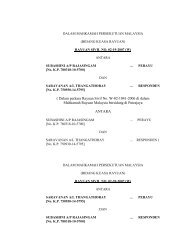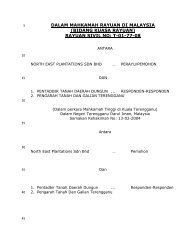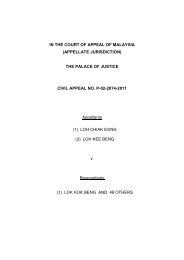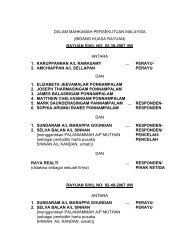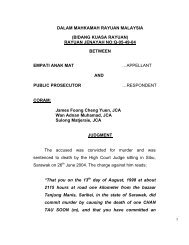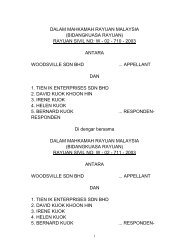rayuan sivil no. j – 02– 641 – 2006 antara ng see liang
rayuan sivil no. j – 02– 641 – 2006 antara ng see liang
rayuan sivil no. j – 02– 641 – 2006 antara ng see liang
Create successful ePaper yourself
Turn your PDF publications into a flip-book with our unique Google optimized e-Paper software.
7<br />
case he said that he did <stro<strong>ng</strong>>no</stro<strong>ng</strong>>t transfer the 4 lots in question to the<br />
appellant because he had already settled other property upon him.<br />
In his evidence in chief, given in the form of a witness statement he<br />
said he kept the appellant out because they were <stro<strong>ng</strong>>no</stro<strong>ng</strong>>t in good terms.<br />
In an affidavit affirmed on 17 September 1998 he said that he was <stro<strong>ng</strong>>no</stro<strong>ng</strong>>t<br />
under an obligation to settle the 4 lots on the appellant because the<br />
latter was established in business and was financially well off.<br />
Although there is <stro<strong>ng</strong>>no</stro<strong>ng</strong>> written judgment from the learned judge who<br />
passed away before he could write it, it is apparent to us that he<br />
could <stro<strong>ng</strong>>no</stro<strong>ng</strong>>t possibly have addressed his mind to this inconsistency.<br />
Here you have a case where a you<strong>ng</strong> child is given the property<br />
which he some 40 years later asserts as his own as havi<strong>ng</strong> been<br />
gifted to him. The man who made the gift was dead when the<br />
assertion was made. Based on his own evidence of ill will against<br />
the appellant, there was a stro<strong>ng</strong> motive for the defendant to deny the<br />
trust. This is an element which the learned judge should have taken<br />
into consideration when assessi<strong>ng</strong> the defendant’s evidence. It is<br />
our respectful view that had the learned judge judicially appreciated<br />
the defendant’s evidence and treated it with suspicion and caution he<br />
would <stro<strong>ng</strong>>no</stro<strong>ng</strong>>t have found against the appellant. Put differently, a<br />
reasonable tribunal acti<strong>ng</strong> upon the facts and evidence presented to<br />
the court below in the instant case and properly directi<strong>ng</strong> itself on the<br />
law would have found against the defendant.<br />
7. Havi<strong>ng</strong> come to the conclusion there could have been <stro<strong>ng</strong>>no</stro<strong>ng</strong>><br />
judicial appreciation of the evidence we have <stro<strong>ng</strong>>no</stro<strong>ng</strong>> alternative but to<br />
intervene. True it is that the ri<strong>ng</strong> of truth is more audible to the


